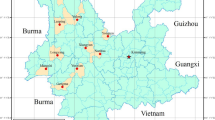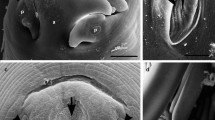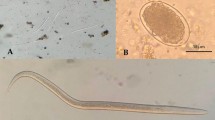Abstract
DURING the period December 1954–April 1956, the lungs of a total of 191 wild rats from Cambridge, Cardiff, Liverpool, London, Nottingham, St. Albans and Wolverhampton were examined for lungworms. They included 24 Rattus rattus L. and 167 Rattus norvegicus Erkl. It was only possible to examine fresh lungs of nine Rattus rattus from London. The remaining lungs were collected by staff of the Infestation Control Division of the Ministry of Agriculture, Fisheries and Food. They were preserved in 10 per cent formalin and examined later. None of these rat lungs was infested with Angiostrongylus cantonensis (Chen., 1935), and in no case did the lung tissue appear to be abnormal pathologically.
This is a preview of subscription content, access via your institution
Access options
Subscribe to this journal
Receive 51 print issues and online access
$199.00 per year
only $3.90 per issue
Buy this article
- Purchase on Springer Link
- Instant access to full article PDF
Prices may be subject to local taxes which are calculated during checkout
Similar content being viewed by others

Author information
Authors and Affiliations
Rights and permissions
About this article
Cite this article
SANDARS, D. Lungworm from Rats captured in Britain. Nature 179, 109–110 (1957). https://doi.org/10.1038/179109b0
Issue Date:
DOI: https://doi.org/10.1038/179109b0
Comments
By submitting a comment you agree to abide by our Terms and Community Guidelines. If you find something abusive or that does not comply with our terms or guidelines please flag it as inappropriate.


